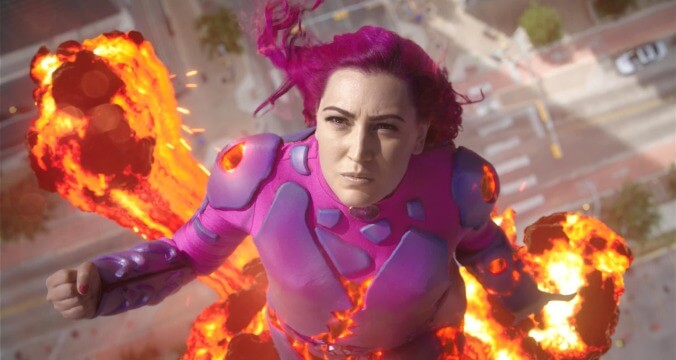Robert Rodriguez goes back to the kids’ table with the sweet but chintzy We Can Be Heroes

Ever the multi-tasker, director/writer/producer/cinematographer/editor Robert Rodriguez worked on an episode of The Mandalorian that aired on Disney+ a few weeks before the release of We Can Be Heroes, his new Netflix movie. Both of them feature Pedro Pascal, yet it’s the feature-length film, not the 30-minute TV episode, that feels like it could have been completed over a series of lunch breaks. Yes, after making one of his best and most ambitious films, Rodriguez is back in his green-screen garage, producing kid movies that feel handmade, provided the hands in question know their way around rudimentary CGI.
The busy, overlit look of a later-period Rodriguez family adventure is a good aesthetic fit for Netflix. We Can Be Heroes even gets to revive a long-dormant not-really-franchise. It’s not exactly a sequel to 2005’s The Adventures Of Sharkboy And Lavagirl, but those former kid superheroes do appear, all grown up—and in Sharkboy’s case, masked to conceal the fact that he’s no longer played by werewolf hunk and martial-arts enthusiast Taylor Lautner. Sharkboy and Lavagirl (Taylor Dooley) also have a superpowered daughter of their own called Guppy (Vivien Lyra Blair), the most pint-sized of a group of superheroes’ kids thrown together when invading aliens waylay their famous parents.
One of those parents is Marcus Moreno (Pascal), a former “heroic” (the movie’s find-replace version of slangy nicknames like “super” or “supe”) and single dad who now sticks to a desk job at the behest of his un-powered daughter Missy (YaYa Gosselin). Marcus still gets captured by the aliens, which is how Missy winds up in superhero daycare, mixed into an eclectic yet calculated group of personalities that’s like the New Mutants crossed with the Burger King Kids Club. The mini-heroes—including stretchy Noodles (Lyon Daniels), super-strong Wheels (Andy Walken), powerful vocalizer A Capella (Lotus Blossom), and multi-powered Wild Card (Nathan Blair)—decide to defy heroics administrator Ms. Granada (Priyanka Chopra Jonas) in order to fight the alien threat.
There are a few surprises from there, though the movie’s biggest twists also retroactively undermine its dramatic tension. (This might also be a plus to the target audience, rather than a source of deflation.) The best one emphasizes character over plot: Missy does not reveal a long-dormant superpower of her own, and is selected to lead the group anyway, much to the initial chagrin of designated charismatic frontman Wild Card. Keeping a powers-free kid at the center of the story (and having her experience self-doubt without wallowing in it) allows the superpowers to inform zany antics rather than indoctrinating kid viewers to superheroic power fantasies.
For superheroic filmmaking, though, better to rewatch one of those teenage power fantasies. Apart from some bendy physical comedy, We Can Be Heroes rarely recalls the dexterity of Rodriguez’s best action filmmaking. This wasn’t always the case for his kid-targeted work; the first three Spy Kids movies convey an authentically childlike sensibility with real showmanship and weird, funny jokes. Heroes may assemble an agreeably motley crew of famous adults to play on the sidelines (Pascal is joined by Boyd Holbrook, Sung Kang, and Christian Slater), but there’s no Antonio Banderas/Carla Gugino chemistry to enliven any of those bit parts. Quite to the contrary: Some of the actors, particularly Priyanka Chopra Jonas, gesticulate like they’re acting out an animator’s model sheet. Sometimes this is fun—Rodriguez has one good gag about the adult heroes striking poses when they realize a camera is present. Often, like a lot of the performances, the film hits the same note over and over.
It’s hard to get mad at We Can Be Heroes, even when it’s coming across like a seminar on peer leadership or offering multiple bad David Bowie covers to justify its title. Rodriguez’s kid movies are always sweet-natured, and do an admirable job of speaking directly to their target audience. But while he can generate countless environments from his Austin studio, the camerawork on these projects, constrained and uninspired, hints at their single-room origins. Adult viewers may find themselves parenting the filmmaker: Robert, maybe it’s time for you to go outside and play?